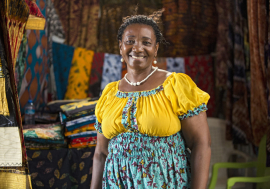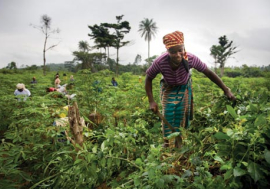Some described it as a global game-changer. The African Continental Free Trade Area (AfCFTA), one of the world's largest international free trade areas, started trading under preferential arrangements on 1 January 2021.
With the COVID-induced recession subsiding as vaccination rates increase, there was great hope for the AfCFTA to show that it could live up to its hype. So, what has worked?
Since trading began on 1 January, some intra-African trade under AfCFTA arrangements based on anecdotal evidence has taken place, including alcoholic beverages and cosmetic products (recent data on trade flows are not yet fully available).
Although intra-African agricultural trade remains below 20 percent compared to more than 60 percent for Europe and Asia, trade is projected to grow once negotiations have come to an end and trade barriers are progressively rolled back.
To date, 42 out of 55 African countries have ratified the agreement, and 88 percent of the negotiations on product-specific rules of origin have been concluded, covering more than 70 percent of intra-African trade according to the AfCFTA Secretariat in 2021.
However, a significant shortcoming of the agreement is that many nutrition-sensitive goods may not be fully liberalised or progressively liberalised over longer periods, as indicated by ongoing negotiations on tariff offers. Examples of protected goods include live animals, meat, fish, milk and dairy products, fruit and vegetables, coffee, tea, spices, oilseeds and sugars.
Africa’s agricultural commodities and raw materials have traditionally dominated trade with the rest of the world (cocoa, coffee, cotton, tobacco and spices) with a mix of processed goods (cane and beet sugar, prepared or preserved tunas, wine and other food preparations).
For the AfCFTA to reach its full potential by exploiting the full range of the agri-food value chain, including agro-processing, governments and development partners need to step up efforts to scale up intra-African trade by providing policy and capacity-building support to the private sector, programme development, knowledge management, and data collection and analysis.
The Food and Agriculture Organization of the United Nations (FAO) provides just such support to governments, the private sector, and smallholder farmers to take full advantage of what the agreement and pan-African trade have to offer.
In support of AfCFTA implementation, FAO, in collaboration with the African Union Commission, launched the Framework for Boosting Intra-African Trade in Agricultural Commodities and Services in April 2021 to guide policymakers, the private sector, and civil society to develop and expand sustainable, inclusive and resilient intra-African trade. This framework and other knowledge products produced by the Organization also serve as tools for advocacy, dialogue, analysis and policy implementation.
In the future, enhancing food control systems is a crucial part of growing and sustaining the expansion of intra-African agricultural trade. In this respect, FAO provides the necessary support to strengthen the capacity of countries to comply with food safety standards and facilitate trade.
The Organization also promotes inclusive agribusiness value chains to expand intra-African trade and improve food security and livelihoods, especially among vulnerable groups such as women and youth. Finally, an essential component to the success of the AfCFTA is readily accessible data. Market and trade data must be democratized and digitised to allow micro, small and medium enterprises to grow and maximize their trade potential.
FAO is working to build and integrate trade and market information systems at all levels of the agricultural value chain to ensure inclusive agri-food systems.
There's still work to be done, but with a year under its belt under less than ideal circumstances due to COVID-19, the AfCFTA has shown positive signs that give hope for a future where African trade rises as the global game-changer it is promised to be.
It is more important than ever that countries come together with development partners to consolidate the gains made in 2021 by building productive capacity, supporting investments in critical input and output market infrastructure, putting in place harmonized food controls, trade and market information systems, and ensuring inclusive markets that can lift the most vulnerable out of poverty.
By Ameir Mbonde, Food and Agriculture Organization (FAO) Regional Office for Africa Trade Policy Specialist















